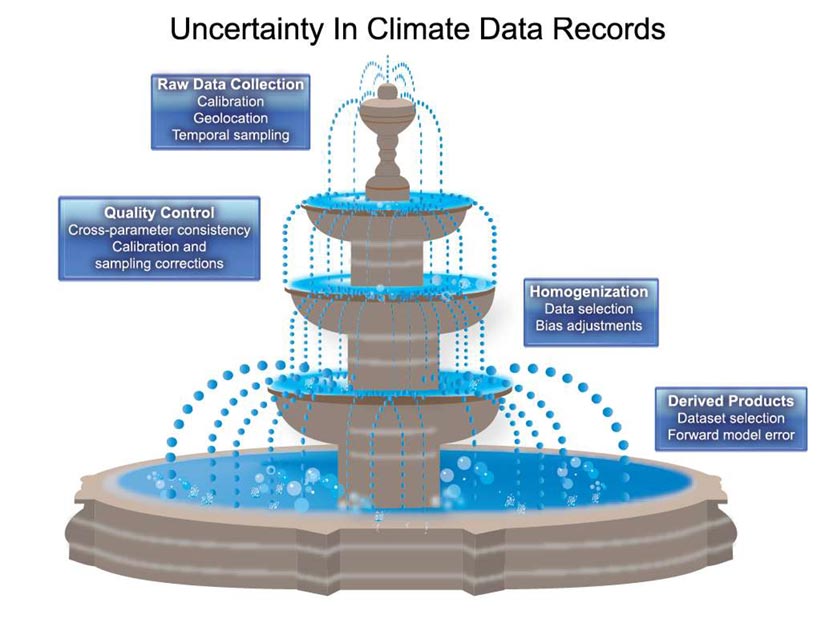
Uncertainty in climate data records: it is necessary to understand all the uncertainties in the observing system and data manipulation processes. Additional uncertainties are introduced at each level leading to an uncertainty cascade
Policy makers rely on climate observations and model predictions that inherently contain uncertainties. Accurate characterization of these uncertainties is necessary to make well-informed decisions. Observations are key to uncertainty quantification (UQ) in climate research because they form the very basis for any evidence of climate change and provide a corroborating source of information about the way in which physical processes are modeled and understood.
Observations themselves possess uncertainties originating from many sources including measurement error and errors imposed by the algorithms generating derived products (see figure). Over time, global observing systems have undergone transformations on pace with technological advances and these changes require adequate quantification of resultant imposed biases to determine the impact upon long term trends. The uncertainties in climate observations pose a set of methodological and practical challenges for both the analysis of long-term trends and the comparison between data and model simulations.
The data flow for a climate data record, illustrated as a “fountain” in the figure, shows that at each level of climate data manipulation, additional uncertainties are introduced. At the premier level, raw data is affected by measurement errors. During the quality control procedures of the next level, uncertainty may be introduced when correcting the geolocation of measurements and identifying inconsistent measurements. The homogenization methods used to remove systematic bias and data artifacts at the next level may introduce additional uncertainty. Finally, both the choice of dataset to use as input and the forward model algorithms applied to generate derived products may introduce another layer of uncertainty. The typical climate data user gathers records from the “pool” at the bottom of this “fountain”, thereby realizing the total sum of uncertainties from all the preceding levels.
To bring together climate scientists, statisticians, and mathematicians, including graduate students from all over the country, to address these issues, Jessica Matthews at CICS-NC organized a workshop jointly with the Statistical and Applied Mathematical Sciences Institute (SAMSI). Identification of possible steps to work towards the mutual goal of robustly characterizing uncertainty in climate observation was a major outcome. Due to its success and interest received from the community at large, we intend to evolve the 2012 Uncertainty Quantification for Climate Observations workshop into a regular event.
Matthews, Jessica L., Elizabeth Mannshardt and Pierre Gremaud, 2013. Workshop on Uncertainty Quantification for Climate Observations. Bull. Am. Met. Soc., doi: 10.1175/BAMS-D-12-00042.1
